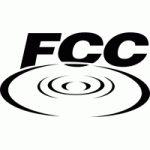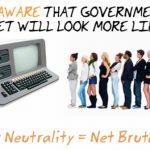Google, Verizon outline net neutrality proposal

While much of the speculation surrounding Google and Verizon's discussions adjoining net neutrality appeared to significantly diminish the idea's central precepts, it now appears that the concept may not be dead after all.
The two companies announced Monday a framework from which the FCC and legislators can work from. Proponents of net neutrality appear to have scored a victory in that one of the seven key principles of the agreement appears to be that wireline internet traffic can not be prioritized. At the same time, there also appears to be several loopholes which may weaken the agreement overall.
FCC Calls off closed-door net neutrality talks

Thursday, the Federal Communications Commission said it had called off private discussions with network operators, service providers, and Internet lobbyists focused on network neutrality legislation. Participants included representatives from Google, AT&T, Verizon, Skype, NCTA, and the Open Internet Coalition.
"We have called off this round of stakeholder discussions," FCC Chief of Staff Edward Lazarus said on Thursday. "It has been productive on several fronts, but has not generated a robust framework to preserve the openness and freedom of the Internet -- one that drives innovation, investment, free speech, and consumer choice. All options remain on the table as we continue to seek broad input on this vital issue."
Google disputes it has deal to pay Verizon for Internet priority

Several news services including Bloomberg and Reuters are reporting that Google and Verizon have reached a deal which would regulate how Internet traffic would be handled. While generally upholding net neutrality principles, it does seem to offer Verizon considerable leeway.
Google defended itself on Thursday, claiming reports that it had paid Verizon for Internet priority were false, specifically the account provided by the New York Times was wrong. It did not refute reports that a deal had been reached, which was reported by other outlets.
FCC opens up for public comment on its new 'third way' to regulate the Internet
Toward a 'Fourth Way:' Congress prepares to completely overhaul telecom law

In an acknowledgment that the regulatory compromise proposed earlier this month by Federal Communications Commission Chairman Julius Genachowski, at the very least, may be inadequate for a long-term resolution to the debate over who or what gets to regulate the Internet in the US, Democratic leaders of both houses of Congress said today they will set the wheels in motion, starting now, for a potential rewriting of all US telecommunications law.
Such an act could, if successful -- and if it can be accomplished in our lifetimes -- finally codify just what Internet communications is and what it does, not with respect to or in comparison with the telephone or the public airwaves. And it could very well result in an entirely new regulatory structure that's not the FCC as we know it today, but may yet have the Congressional authority and mandate to regulate network neutrality in some form.
Who's more neutral? Republican bill would forestall FCC's 'Third Way'

It was inactivity from Congress on the matter of broadband Internet regulation that forced US Federal Communications Commission Chairman Julius Genachowski into an almost impossible situation. Taking what appeared to him to be the only legal and rational approach available, he boldly suggested last week that the Commission set up a system for splitting hairs over which parts of broadband fall under Title II of the Telecommunications Act, and which ones fall under Title I.
Perhaps unsurprisingly, it's the FCC's effort to accomplish what Congress couldn't, that has spurred at least some parts of Congress into action. Yesterday, one of the House's leading net neutrality skeptics, Rep. Cliff Stearns (R - Fla.), made good on a pledge his office revealed to Betanews last October, drafting new legislation that would prevent the FCC from building a "Third Way" for itself, unless it could prove to Congress that there was an emergency, and it could provide a cost/benefit analysis supporting its theory.
Amazon on FCC's 'Third Way:' 'It's not about regulating the Internet'

We've always known that the Internet has evolved since 1996 (whose laws were based to some degree on the world circa 1978) to something that current US telecommunications law doesn't adequately describe. The whole court debate over whether the Federal Communications Commission could legally address how Comcast manages its network traffic wasn't really about whether it should, but rather whether current law designates that it can.
Up until yesterday, the two choices before the FCC were whether the broadband system it wants to regulate is more like a telephone (Title II) or a teletype (Title I). For years, its leaders argued that Title I of the Telecommunications Act, amended in 1996, was more fitting, making the case that since broadband services were usually piggy-backed over communications services anyway, its ancillary authority to protect information services could be attributed to its primary authority to protect communications services. In a decision very, very likely to survive judicial review, the DC Circuit said that's wrong.
The Third Way: FCC attempts strange 'Title 1.5' broadband reclassification

Since 1996, the Federal Communications Commission accepted, and has positively argued even up until two months ago, that broadband Internet service is an information service under US law -- an enhancement to telecommunications service that is regulated under Title I of the Communications Act. But when the FCC made its strongest effort to censure a carrier for net neutrality violations -- its fine of Comcast for throttling BitTorrent -- the DC Circuit Court said that wouldn't fly under Title I.
So policy advocates pressed the FCC to simply redeclare broadband Internet service as a real communications service under Title II. That would put broadband on a par with wireless voice, and give the Commission the authority to tell Comcast, or anyone else, how not to police its network traffic. The downside of that approach could be that US carriers may pull back on broadband buildout investments, which could render the ambitious goals of the Broadband Plan unattainable.
A broadband plan of sorts goes forth, with muted net neutrality

The strategy being employed by the Federal Communications Commission, as put forth yesterday, is to treat its loss to Comcast in DC Circuit Court two weeks ago not as a defeat of its ability to implement the entire Broadband Plan...and then hope that no one puts up any new roadblocks toward deploying at least most of it.
The priorities the FCC put forth during yesterday's open hearing are perhaps the ones that would generate the least friction from possible opponents. One of these priorities is reflected in a major rule change yesterday with respect to what regulators originally thought should be an oxymoron: home roaming.
Interview: Internet coalition leader sees a way through for the Broadband Plan

Last Tuesday, in a conference that included invited members of the press including Betanews, Markham Erickson, the Executive Director of the Open Internet Coalition -- which advocates for Google, Facebook, PayPal, Netflix, Skype, Sony, Twitter, Amazon, and TiVo, among others -- urged the Federal Communications Commission to bounce back from its loss to Comcast last week in DC Circuit Court, by affirming its right to regulate broadband Internet services under a different section of US telecommunications law than it's used before.
Since that time, a surprising amount of water has passed under the bridge, including a round of Senate hearings Wednesday in which leaders suggested new legislation could solve the problem, so that the FCC would not have to declare regulatory authority under Title II of the Telecommunications Act -- the part that typically applies to telephone networks. A key Senate Republican, Kay Bailey Hutchison (R - Texas), vowed to oppose any effort by the FCC to redeclare under Title II.
Key senator gears Congress for a long fight to reform the FCC

A long-planned hearing on Capitol Hill to discuss the Federal Communications Commission's Broadband Plan took on new meaning yesterday, a week after the DC Circuit Court ruled the Commission lacked the authority to implement net neutrality regulations. With a coalition of Internet business interests pleading with the FCC to declare itself the "cop-on-the-beat" for net neutrality under a different provision of US telecom law than it had been using, now Sen. Jay Rockefeller (D - WV), chairman of the Senate Commerce Committee, says the FCC may not need to take that step.
In his remarks yesterday, Sen. Rockefeller told his committee he's ready to begin the long, and undoubtedly arduous, process of changing the law to give the FCC the authority that the Broadband Plan assumed it had to begin with.
Skype and colleagues to FCC: Declare yourself fit to regulate the net

Last week's staggering defeat to Comcast in a landmark DC Circuit Court decision left the US Federal Communications Commission stripped of any "ancillary authority" it thought it had to regulate the practices of Internet service providers. As of now, it isn't exactly clear just which government agency does have that authority.
Rather than wait for Congress to make a decision on the matter -- an event which may, arguably, never happen at all -- a coalition of major Internet stakeholders, including Skype, Google, eBay, Amazon, Netflix, TiVo, and Facebook are calling on the FCC to take action. Quite literally, they want the Commission to convene a hearing declaring its intention to fill the gap left by the court's removal of FCC authority...with FCC authority.
The net neutrality roadblock: Now only Congress can act

Where do the new media of the Internet stop, and the government regulatory bodies created for old media begin? A decision in favor of Comcast on Tuesday by the DC Circuit Court of Appeals does not answer that question; on the contrary, it actually asks the question all over again, this time under closer scrutiny from both the courts and the general public.
Tuesday's overturning of a Federal Communications Commission order that Comcast stop throttling certain applications of its Internet traffic, is a blow to proponents of the net neutrality provisions recently outlined as official principles by FCC Chairman Julius Genachowski. "Official principles" are not laws, and thus cannot be regulated -- that's what the DC Circuit Court of Appeals has ruled.
Court rules that FCC can't stop Comcast from throttling traffic

In August 2008, the Federal Communications Commission issued a cease and desist order to cable company Comcast, demanding it stop throttling BitTorrent traffic. It was considered the first citation ever for the violation of net neutrality rules.
Comcast then filed suit against the FCC, contesting that the Commission overstepped its boundaries because net neutrality guidelines were not a law. They're not.
One less news app: Did BBC's iPad support threaten the EU's 'Digital Agenda?'

Either the news media is convinced that Apple's forthcoming iPad is the vehicle for delivering news publishing out of its funk, or it's convinced that Apple is conspiring to circumvent the natural course of news with its own walled garden platform. In any event, in the portion of the universe where the two parties are evidently not in bed with one another, the BBC reports that it has been forced to indefinitely postpone the rollout of its iPhone/iPod touch/iPad newsreader app, after the EU's trade group for newspapers complained it could pre-empt their plans to migrate online.
Today, the BBC Trust, which sets policy for the Corporation and serves as its board of directors, put a hold on next month's planned release of the BBC news reader, which would have been distributed for free. The BBC is sustained by UK citizens who pay regular license fees, so on paper, the reason for the delay is to determine whether free distribution of the app goes against its mandate.
But BBC News didn't muzzle its own impression of the Trust's intent. In its report this afternoon, it noted the Trust's citation of "representations from industry" as contributing to its postponement decision.
Recent Headlines
Most Commented Stories
BetaNews, your source for breaking tech news, reviews, and in-depth reporting since 1998.
Regional iGaming Content
© 1998-2025 BetaNews, Inc. All Rights Reserved. About Us - Privacy Policy - Cookie Policy - Sitemap.